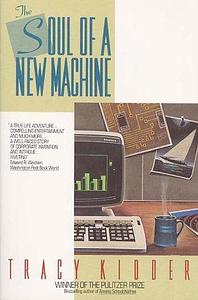Take a photo of a barcode or cover
This is the 2nd time I've read this book and it took on a new meaning after being part of a huge AWS product launch. The feeling of camaraderie, pride, and purpose was something that I had just recently experienced which made me relate to the engineers and managers in a different way.
I loved it the first time I read it but somehow was able to love it more. At the time I didn't understand the historical context accurately. I've recently been reading about the timeline of computers which was a big help. Knowing this was in the late 70s is important because this was the rise of the personal computer and the slow death of the minicomputer.
I think it is easy to overlook this book and not understand it for what it was at the time. Computers were still foreign and not many people owned them. They were in lots of workplaces but not everyone had access to them.
This book won a Pulitzer which was surprising to me before I had read it. It was hard to believe a book about a bunch of nerds building a computer would win the prestigious award but you quickly understand how it did this after the preface of the book. Kidder starts the story by introducing the main character, Tom West, an enigmatic man on a boat off the East Coast with a group of strangers as they sail the sea. It expertly foreshadows West's character and his role as the general manager of the computer the book documents. Without ever mentioning a computer you start to wonder if you picked up the wrong book.
I wish another company would open its doors to a skilled storyteller like Kidder. Chronicling a software startup or the creation of a large service at a big company in the same way would be a riveting read given the advancement of tech.
I really recommend this book and consider it one of my favorites. Kidder is an expert at his craft and seamlessly blends the team's stories into the story of the company, Data General, and that into the overarching story of the industry.
I loved it the first time I read it but somehow was able to love it more. At the time I didn't understand the historical context accurately. I've recently been reading about the timeline of computers which was a big help. Knowing this was in the late 70s is important because this was the rise of the personal computer and the slow death of the minicomputer.
I think it is easy to overlook this book and not understand it for what it was at the time. Computers were still foreign and not many people owned them. They were in lots of workplaces but not everyone had access to them.
This book won a Pulitzer which was surprising to me before I had read it. It was hard to believe a book about a bunch of nerds building a computer would win the prestigious award but you quickly understand how it did this after the preface of the book. Kidder starts the story by introducing the main character, Tom West, an enigmatic man on a boat off the East Coast with a group of strangers as they sail the sea. It expertly foreshadows West's character and his role as the general manager of the computer the book documents. Without ever mentioning a computer you start to wonder if you picked up the wrong book.
I wish another company would open its doors to a skilled storyteller like Kidder. Chronicling a software startup or the creation of a large service at a big company in the same way would be a riveting read given the advancement of tech.
I really recommend this book and consider it one of my favorites. Kidder is an expert at his craft and seamlessly blends the team's stories into the story of the company, Data General, and that into the overarching story of the industry.
Written back in 1981, a year before I got my first computer this great books details a time when computers were the New Thing - before they were everywhere becoming invisible items standing out no more than your toaster. This should be required reading for anyone who has an interest in what makes people strive to make new things.
soul of a new machine is ~35 years into the history of computer design (after ENIAC, anyways); we're now ~40 years (!) past publication of the book. how does one even properly evaluate a 40-year-old contemporaneous history of hardware design & architecture? as a piece of history? for its utility in understanding instruction sets and machine code and computer design in the year 2022?
four stars as a text on craftsmanship and the joy of Making Shit Work; four stars as a ~biography of some engineers enduring outrageous toil to shift an incremental advance in the history of computation; three stars as an explanatory text about what, exactly, happens inside of a computer, and what the work of building one entails.
that might be heresy! it's hard to fault tracy kidder's for lacking a crystal ball - how was he supposed to know that [RISC](https://en.wikipedia.org/wiki/Berkeley_RISC) instruction sets were gonna take over the world? but it's also hard to write a 5 star review for a book that talks at length about microcode and instruction sets and how insanely challenging they are to debug when, like, a [conceptual revolution](https://en.wikipedia.org/wiki/Reduced_instruction_set_computer) ON THAT EXACT SAME TOPIC was happening contemporaneously?
like, at minimum, soul of a new machine needs a "20 40 years on" afterword that situates the book as the last gasp of a paradigm for computer design? idk, 4 stars, tracy kidder is a good writer and this won a nobel prize for a reason.
four stars as a text on craftsmanship and the joy of Making Shit Work; four stars as a ~biography of some engineers enduring outrageous toil to shift an incremental advance in the history of computation; three stars as an explanatory text about what, exactly, happens inside of a computer, and what the work of building one entails.
that might be heresy! it's hard to fault tracy kidder's for lacking a crystal ball - how was he supposed to know that [RISC](https://en.wikipedia.org/wiki/Berkeley_RISC) instruction sets were gonna take over the world? but it's also hard to write a 5 star review for a book that talks at length about microcode and instruction sets and how insanely challenging they are to debug when, like, a [conceptual revolution](https://en.wikipedia.org/wiki/Reduced_instruction_set_computer) ON THAT EXACT SAME TOPIC was happening contemporaneously?
like, at minimum, soul of a new machine needs a "
This book was not engaging or interesting, and did not hold my attention.
The Soul of a New Machine by Tracy Kidder is a non-fiction book published in 1981 that chronicles the development of a new computer at Data General Corporation in the late 1970s. The book provides a behind-the-scenes look at the creation of the Eagle, a 32-bit minicomputer, and follows the team of engineers and managers tasked with designing and building it. The book highlights the challenges of developing new technology under tight deadlines and the intense pressure to compete in the computer industry. It also explores the personal and professional relationships between the team members and the impact of the project on their lives.
The Soul of a New Machine by Tracy Kidder is a non-fiction book published in 1981 that chronicles the development of a new computer at Data General Corporation in the late 1970s. The book provides a behind-the-scenes look at the creation of the Eagle, a 32-bit minicomputer, and follows the team of engineers and managers tasked with designing and building it. The book highlights the challenges of developing new technology under tight deadlines and the intense pressure to compete in the computer industry. It also explores the personal and professional relationships between the team members and the impact of the project on their lives.
informative
medium-paced
adventurous
inspiring
medium-paced
This is my all-time favorite and oldest favorite - I have read and re-read this book multiple times. It reminds me why I am fascinated with software and hardware development - and why it was so exhilirating to have been an engineer building machines like this in the early 90's.
hopeful
tense
medium-paced
challenging
informative
reflective
medium-paced
You don't have to have a degree in Computer Science or even a technical background to appreciate this book - but it certainly helps.
Being completely upfront - the material is very dry and very technical. There's a lot of office politics, although it fits perfectly in the overall fabric of the story.
What I loved about the book was seeing the history of modern computers through the eyes of the engineers who gave their blood, sweat, and tears for their machines. I also was completely fascinated with how much math and logic went into designing the early computers. We really take so much for granted now. There was a time when a group of engineers might look at a chalkboard diagram of logical algorithms and discuss the most mechanically efficient means to achieve the design in registers and wires.
The office politics aspects would be the only real negative for me. The story can be captivating, for those I think who appreciate how far our technology has come. The programmers and engineers today stand on the shoulders of giants from the 60s and 70s.
Being completely upfront - the material is very dry and very technical. There's a lot of office politics, although it fits perfectly in the overall fabric of the story.
What I loved about the book was seeing the history of modern computers through the eyes of the engineers who gave their blood, sweat, and tears for their machines. I also was completely fascinated with how much math and logic went into designing the early computers. We really take so much for granted now. There was a time when a group of engineers might look at a chalkboard diagram of logical algorithms and discuss the most mechanically efficient means to achieve the design in registers and wires.
The office politics aspects would be the only real negative for me. The story can be captivating, for those I think who appreciate how far our technology has come. The programmers and engineers today stand on the shoulders of giants from the 60s and 70s.



